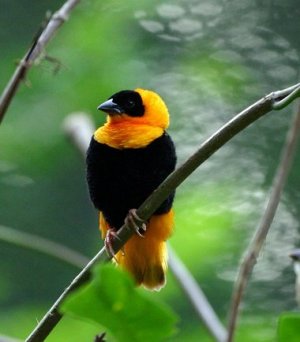 Hatchery Rearing: Natural Selection Vs. Fecundity Selection
Hatchery Rearing: Natural Selection Vs. Fecundity Selection
 Introducing A08: Will He Survive?
Introducing A08: Will He Survive?
Hooty Help
Posted
|
Views: 923
Hooty Help
with your favorite owl
Harriet
Dear Harriet,
Lately, it's been pretty tough in here at the bird sanctuary. My mates are all closely related to me, and our numbers have been sparse. How can I keep our population alive and have there be some better mates for the next generations? (My cousin Rudy just isn't going to cut it for much longer! He can hardly see well enough to break up the seed that our zookeepers give us). Please tell me what I can do to pick a better mate and keep the red Bishop line aloft!
Bliss, the southern red Bishop

Dear Harriet,
I feel like my home hasn't been that great lately. Every time I walk about, my feathers drag so far against the ground and I feel like nobody watches my dance even though I try so hard to practice it. I feel like if I were just released into the wild things would be much better for me. You've gotta help, Harriet!
Perry, the Peacock
Dear Harriet,
I'm a special kind of dove, and my relatives were the ones who have always been the stars in movies (namely, the ones from Mary Poppins). Well, I haven't been quite as much of a star lately and I'm really worried that there isn't much unique about me anymore. My Australian accent sounds just like my British one, and my wife thinks that when we end up travelling away from the zoo for work that we are going to get really stressed out. Subsequently, she isn't that interested in having my babies because she thinks they'll be afraid and won't know how to adjust either. Is she just going coo-coo?
Danny, the dove
Bliss,
Well, as you know, I've spent many years in a sanctuary and have been taught a lot about captivity and variation by my zookeeper and researcher, Robert C. Lacy. Your keeper probably knows that you're being kept with other small and often endangered birds. With careful management, these populations can be kept from further decreasing in size. Lacy says “an immediate effect of the depletion of genetic variability is increasing homozygosity of the individuals in the population” and this leads to lower viability of your offspring.
Did you know that lots of humans have the misconception that animals in captive populations are safe from extinction? Well, this isn't necessarily true because of the lack of genetic variation in many captive populations. Make sure you're choosing the mates who build the best nests, those ones will help you produce more viable offspring. Best of luck to you, deary!
-Harriet
Perry,
Times are tough for the caged bird that dances. Although, I'm not so sure if I were you that I would be flapping at the chance to get out of your safe habitat. It's a rough world out there and if you and your species do not adapt to the environment when you are released, you'll be “susceptible to new predators, diseases, parasites, climatic condition, competitors, and changing food supply." Have there been any new immigrating peacocks to your area? If so, there might be a higher chance of new birds watching your dance and as my zookeeper says, " genetic variants introduced into a population by immigration act to restore alleles that formerly existed in the population." So for right now, I'd hang tight and make sure that you keep up your dancing, the right lady will come along soon. Keep me updated!
-Harriet
Danny,
Captive populations, like us, may lose “evolutionary flexibility” fairly quickly. This means that zoos must find a way to diminish the rapid lack of genetic variability in populations. Hoo, there seems to be a bit of a trend in the worries of our captive friends this week!
Well, the loss of our evolutionary flexibility is quite troubling. On the bright side, mutation won't be much of a problem for us. Oh, but now that I think about it this is one less thing driving our evolutionary force as birds!The idea of evolutionary flexibility was figured out by my zookeeper, who did a series of computer simulation tests that randomly bred small populations of individuals in order to figure out the amount of heterozygosity in a group. I can say your wife definitely has something to her fears. Make sure that your wife isn't actually your bird sister, that might help your babies be more successful. Hope to see you all in an upcoming flick!
-Harriet
All quotes from :
Lacy, Robert C. “Loss of Genetic Diversity from Managed Populations: Interacting Effects of
Drift, Mutation, Immigration, Selection, and Population Subdivision.” Department of
Conservation Biology 1.2 (1987): 143-158. 15 March 2016.
 Magazine Posts
Magazine Posts Table of Contents
Table of Contents